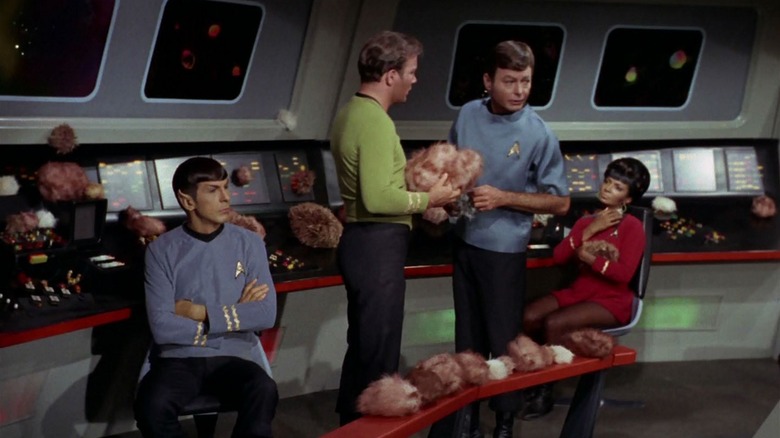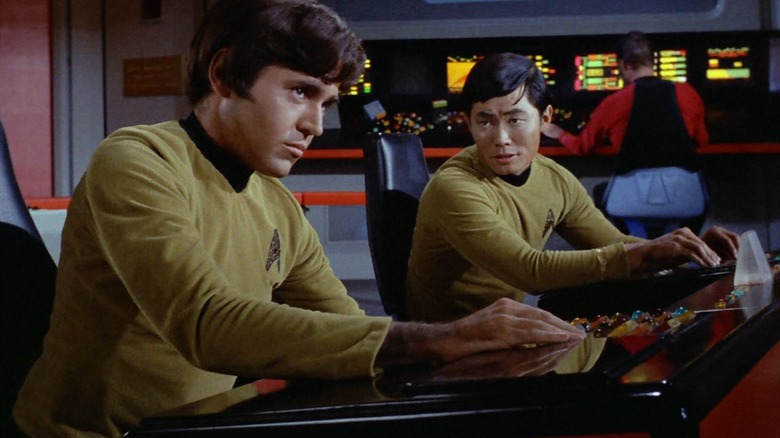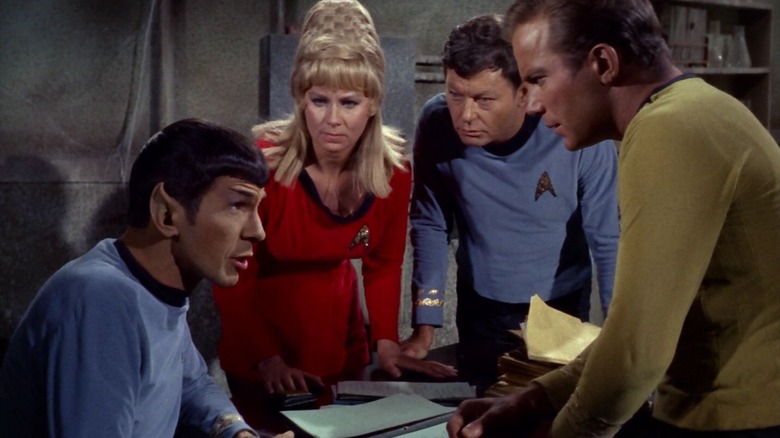Do Star Trek Actors Get Residuals? Here's The Truth
Gene Roddenberry's "Star Trek" may take place in a post-capitalist utopia wherein no character longs for wealth, but here in our society, its actors cannot live with that luxury.
Trekkies will be able to tell you that "Star Trek" wasn't a huge hit when it first aired from 1966 to 1969. It definitely had a small and passionate cluster of fans, and the show was saved from cancelation at least once thanks to a concerted letter-writing campaign, but it was never a top-10 type of show in the ratings. "Star Trek" wouldn't become a cultural phenomenon until it began airing in reruns in the mid-1970s. By then, it was more widely accessible, new superfans emerged, and "Star Trek" conventions became a thing. Gene Roddenberry appeared at these conventions, and he began to relitigate his own show, with fan encouragement, realizing that he had indeed created a utopian text.
The stars of "Star Trek," meanwhile, were able to leverage their limited earnings from the show into convention appearances, as they weren't getting any money in residuals. As unfair as it may seem, the original cast members of the series — William Shatner, Leonard Nimoy, Nichelle Nichols, DeForest Kelley, George Takei, Walter Keonig, and James Doohan — didn't get any royalty payments for those 1970s reruns. Doohan, in a 1979 interview with the Fort Worth Star-Telegram (quoted by the Heroes & Icons website), admitted that neither he nor his co-stars got a dime from "Star Trek" reruns after the year 1971. In 2020, William Shatner said on Twitter that he receives no royalties for anything "Star Trek"-related before 1973.
Those who assume all TV stars were able to live high on the hog based entirely on residuals for endless reruns need to remember that many of them were stiffed out of said residuals because of unfair contracts.
No actors got a dime in residuals after the early 1970s
Shatner's above-mentioned Twitter beef saw him arguing with a bitter fan about his personal wealth. Shatner recalled that the late-1960s were not a rosy time for working actors, as the assumed pattern of royalty payments hadn't become an industry standard. He wrote:
"Anything before 1973 (that includes 'Star Trek' Original Series) doesn't pay a cent in royalties. So please don't think you own me or I owe you something for watching. It doesn't work like that."
Shatner also talked about his lack of royalty payments on the Transporter Room 3 podcast, hosted by IGN (and reported on by The Hollywood Reporter), clarifying that in those days, no actor on any TV series got residuals for reruns after a few years. After all, it was considered most people assumed no TV show would continue to air in reruns for more than a few years anyway. As such, no studios bothered to write any royalty-based contracts for any actors. No one could have predicted that "Star Trek" would strike a decades-long syndication deal that would keep it on the air for literally decades.
Back in the Fort Worth Star Telegram interview, Doohan noted that the unfair payments for the "Star Trek" cast was a motivating factor in a widespread contract restructuring throughout Hollywood. He said that "Our situation was what prompted the Screen Actors Guild to change the rules. [...] Now, you get paid for all reruns." That, after only three years on the air.
On SAG's own website, it is written that royalties didn't exist before 1960. A successful strike eventually put royalties contracts into play, but sadly, retroactive payments were not part of the negotiations, and studios did not have to pay royalties to actors in movies released before 1960. Anything made in 1960 and beyond, however, involved residual payments.
A brief history of residuals
It was in 1960 that SAG also finally set up a pension fund. For the next 14 years, however, TV stars were still getting stiffed. "Reruns" were still, it seems, a novel concept, or at least a concept that studios were willing to ignore when it came to paying royalties to their actors. Falling in line with Doohan's and Shatner's comments, SAG "jointly negotiated the contract covering primetime dramatic programming on the major television networks for the first time" in 1974.
In 1980, entertainment unions had to go on strike again when studios tried to withhold royalties for home video sales and for pay TV like cable. Indeed, one might find that most SAG or WGA strikes have been, throughout its history, about the withholding of residuals. The union's longest strike came in 1988, and that was largely about how residuals for TV broadcasts in international markets were not being paid. In 2007 and 2008, the unions went on strike again after studios failed to pay them residuals for online broadcasts. Every new technology, it seems, is seen as a new means by studios to attempt to stiff SAG members.
This was certainly true of the 2023 strikes, which were about trying to get residuals from the notorious Streaming Wars. Streaming services, thanks to a precedent set by Netflix, never released their viewership numbers, and didn't feel any urge to pay royalties to actors as a result. The unions were able to negotiate a payment system, and also demanded that studios stop using A.I. tech to scan their faces and use their images for free. The 2023 strikes were the second-longest in the organization's history ... by one day.
Luckily, the "Star Trek: The Next Generation" cast benefitted from those earlier strikes, and have been able to live off residuals. In the case of actor Wil Wheaton, who played Wesley Crusher, it was all he had for years.


